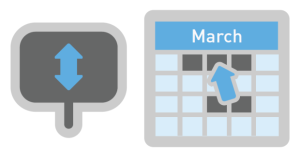Optimizing For Seasonality: 4 Critical Paid Search Strategies
November and December are the most seasonal months for search marketers. For retailers, this holiday shopping period continues to be the most profitable time of the year. In fact, in 2012, over $42 billion was spent online by consumers in these two months alone, a 14% increase over 2011. For other online advertisers, however, the […]
November and December are the most seasonal months for search marketers. For retailers, this holiday shopping period continues to be the most profitable time of the year. In fact, in 2012, over $42 billion was spent online by consumers in these two months alone, a 14% increase over 2011.
For other online advertisers, however, the holiday season represents a significantly quiet period as consumers shift their focus toward retail shopping.
Regardless, seasonal shifts in customer behavior throughout the year, such as during the holidays, influence ad performance and result in opportunities for search marketers to maximize conversions and revenue.
To successfully account for seasonality and maximize revenue outcomes during critical purchase periods, advertisers must address the following paid search challenges:
1. Shifts In Revenue-Per-Click (RPC) & Conversion Rate
Seasonal shifts in paid search RPC or conversion rate significantly affect the bidding landscape and can result in missed opportunities. However, the lack of visibility into forecasted performance makes proactive bid adjustments unreliable, leading to broad bidding strategies that do not account for seasonality, or daily and weekly fluctuations in RPC or conversion rate.
2. Latent Conversions
Since conversions are more likely to occur within the first month after a search click, compared to same session, bidding strategies that do not factor in conversion latency fail to optimize bids for conversion or revenue maximization.
3. Outlying Data
The overwhelming amount of seasonal data limits the ability for search marketers to respond immediately to unpredictable fluctuations in performance. Bid calculations that factor in this irregular performance data fail to maximize conversions or revenue.
4. Promotional Changes
Seasonality produces constant changes to promotional offers and the introduction of new inventory or services. These result in campaigns that fail to align with seasonal activity, negatively impacting relevancy and ad performance.
To address the challenges of optimizing campaigns for seasonality, sophisticated search marketers must satisfy the following requirements:
1. Schedule Bid Adjustments Based On Forecasted Performance
To account for changes in RPC or conversion rate, advertisers need a bidding solution that automatically adjusts bids according to the expected shift in seasonal performance.

Assigning individual boost schedules across business lines provides the flexibility to bid aggressively or dampen bids for in-season and off-season products or services, respectively. Furthermore, quickly identifying and implementing a time-of-day or day-of-week dayparting strategy allows search marketers to optimize campaigns for cyclical effects on customer behavior.
2. Factor Conversion Latency Into Bid Calculations
Conversion latency, the time between the initial ad click and the conversion, varies across advertisers and business lines, ranging from same session to many months. In order to optimize bids using a complete picture of paid search performance, search marketers need an automated way to exclude the most recent days from bid calculations.
Dynamically extending or shortening this rolling window based on business needs enables search marketers to account for varying conversion latencies when maximizing conversions and revenue across business lines.
3. Identify & Exclude Outlying Data
Throughout the year, advertisers experience increases in RPC or conversions due to promotions as well as decreases resulting from stockouts or off-seasons. Platforms that provide multi-layer filters and alerts enable search marketers to manage by exception and quickly identify significant fluctuations in performance.
Accounting for these periods of irregular paid search data is critical to optimizing campaigns for seasonality. Consequently, search marketers require a simple approach for excluding specific dates and date ranges from bid calculations across campaigns and business lines.
4. Align Campaigns With Promotions & Products Or Services
Updating ad creative to reflect seasonal promotions and expanding campaigns to align with in-season products and services requires a scaled workflow. To ensure a relevant consumer experience and immediately capture new conversion and revenue opportunities, search marketers need the ability to quickly find and replace old ad promotions and efficiently build out new product- or service-specific keyword lists.
Review Your Strategy For Seasonality
Even with the holiday season in full swing, there are still ways for advertisers to account for seasonality and prepare for 2014. Start generating a boost schedule by monitoring and reporting on daily RPC or conversion rates. These analyses will come in handy when implementing boost schedules throughout the year. Isolate time periods of irregular performance and exclude those days from bid calculations.
Staying in-tune with your search campaigns throughout the holiday season is just as critical as preparing for the holiday season. In the end, optimizing for seasonality will enable advertisers to remain competitive during the busiest times of the year and maximize revenue outcomes.
Opinions expressed in this article are those of the guest author and not necessarily Search Engine Land. Staff authors are listed here.
Related stories
New on Search Engine Land
